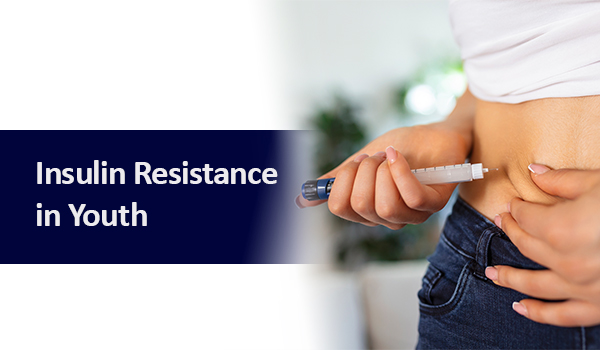
Insulin resistance has emerged as a significant health issue among today's youth. According to a study published in the Indian Journal of Endocrinology and Metabolism, the prevalence of insulin resistance in Indian adolescents is rising. The study found that approximately 20-25% of Indian youth between the ages of 10-19 years have insulin resistance. Insulin resistance occurs when the body's cells become less responsive to the hormone insulin, leading to elevated blood sugar levels. It is prevalent now, affecting young individuals more. The main reasons for insulin resistance are sedentary lifestyles, poor dietary habits, and increasing obesity rates.
Understanding insulin resistance symptoms is crucial for early detection and management. Insulin resistance symptoms include frequent urination, excessive thirst, unintended weight loss, constant fatigue, and blurry vision.
Insulin resistance is a metabolic condition affecting men, women, and children. In men, insulin resistance has been linked to an increased risk of developing conditions such as type 2 diabetes, cardiovascular disease, and obesity. It can also lead to decreased testosterone levels, which can affect sexual function and fertility. In children, insulin resistance is often associated with childhood obesity and can lead to the early development of type 2 diabetes. Additionally, insulin resistance in children can impair growth and development. In women, insulin resistance can have significant implications for reproductive health. It is commonly associated with polycystic ovary syndrome (PCOS), a condition characterized by hormonal imbalances, irregular menstrual cycles, and difficulties conceiving. Insulin resistance in women with PCOS can also increase the risk of developing gestational diabetes during pregnancy. According to the International Diabetes Federation (IDF), in 2019, India had an estimated 77 million adults living with diabetes. This number is projected to increase to 101.2 million by 2030.
Maintaining sugar regulation is not just about avoiding cavities but also about keeping our bodies functioning optimally. When blood sugar levels are too high, it can lead to serious health concerns like diabetes and cardiovascular disease. On the other hand, low blood sugar levels can cause dizziness, confusion, and even loss of consciousness. Insulin plays a significant role in helping us maintain that proper balance.
Another study by the Indian Council of Medical Research (ICMR) reported that sedentary lifestyles and poor dietary habits are major contributors to the increasing insulin resistance rates among Indian youth. The study highlighted that a lack of physical activity and the consumption of high-calorie, low-nutrient foods are prevalent among Indian adolescents.
A sedentary lifestyle, characterized by spending excessive time sitting or engaging in activities that involve minimal physical movement, is a leading contributor to insulin resistance. Regular physical activity improves insulin sensitivity and helps prevent or manage insulin resistance. Therefore, incorporating regular exercise into our daily routines is crucial for maintaining optimal sugar regulation.
Unhealthy eating habits, such as consuming a diet high in processed foods, sugary beverages, and refined carbohydrates, can also contribute to insulin resistance. Excessive sugar consumption causes spikes in blood sugar levels, increasing insulin production. A balanced, nutrient-rich diet is essential for preventing and managing insulin resistance.
Insulin resistance is associated with several health consequences. It is closely linked to the development of type 2 diabetes. Over time, the pancreas may struggle to produce enough insulin to overcome the resistance, resulting in high blood sugar levels. If left unmanaged, this can progress to type 2 diabetes, a chronic condition that requires lifelong management.
Insulin resistance is also associated with an increased risk of cardiovascular diseases, including heart disease and stroke. High blood sugar levels, combined with other factors like high blood pressure and abnormal cholesterol levels, contribute to the development of these severe health conditions. Furthermore, insulin resistance is often a part of a cluster of health conditions known as metabolic syndrome, which includes high blood pressure, high blood sugar levels, excess abdominal fat, and abnormal cholesterol levels. Having metabolic syndrome increases the risk of developing heart disease, stroke, and type 2 diabetes.
Prolonged hyperglycemia (glucose tends to build up in the bloodstream)can damage blood vessels, nerves, and organs, putting individuals at a higher risk for problems like heart disease, kidney problems, nerve damage, and vision loss.
Can insulin resistance reverse?
Yes, reversing insulin resistance through lifestyle modifications and medical interventions is possible. Insulin resistance occurs when the body's cells become resistant to the effects of insulin, leading to elevated blood sugar levels. Individuals can improve their insulin sensitivity by adopting a healthy diet consisting of whole foods, low in processed sugars and carbohydrates, and high in fiber. Regular exercise, particularly aerobic and resistance training, can also help improve insulin sensitivity and promote weight loss.
Take control of your health and prevent insulin resistance at the best endocrinology hospital, Sir Ganga Ram Hospital. Insulin resistance is on the rise among today's youth, with approximately 20-25% of Indian adolescents affected. Recognize the symptoms, such as frequent urination, excessive thirst, and fatigue, for early detection and management. Don't let insulin resistance lead to serious health problems like diabetes and cardiovascular disease.
For more information, book an appointment with Sir Ganga Ram Hospital for expert guidance and care.